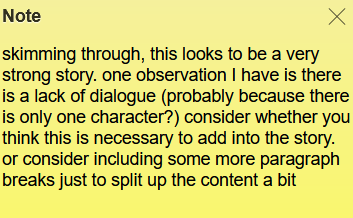Feedback Received
Bias


When writing about subjects that evoke passion or other strong emotions, it is easy to let my biases become overly apparent. While some degree of bias is inherent to writing from your own perspective on any issue, too much bias can easily detract from the quality of my writing and actually make an argument less convincing or engaging. The recommendations I received to tone down my own perspective and approach the specific facts behind the issues I was writing about was an excellent way to round out my non-fiction writing and boost my credibility as a writer.
Scope

When starting any project, I tend to bite off more than I can chew at the beginning. This feature article was no exception. To explore the entire history of Iran in the way that I initially planned for would have been untenable, particularly with the word limit. Limiting the scope of my article to the issue I felt most interested in not only made the assignment much more manageable, but also allowed me to dive deeper into the minutia of that issue than I would have been able to with a broader focus. I still had the opportunity to explore some aspects of the broader history I was originally researching, but doing so within the bounds of Mahsa Amini’s story and exploring how those aspects connected to and influenced the current crisis of Iran created a much better end product than I would have had otherwise.
Dialogue


The strong suits of my writing have always been exposition, setting development, and long, descriptive passages, but when writing a story, these alone do not make a cohesive product. In writing my short story, I sought to explore themes of loneliness and alienation, which further dissuaded me from adding dialogue, but as a result, my first draft felt incomplete. The idea of adding flashbacks to create more opportunities for dialogue was very helpful for further developing this story, making it feel less like a fragment of something larger and more like a complete narrative. Doing so also helped make the pacing of the story far more fluid, and made the descriptive passages less tedious for readers.
Word Choice


Clarity of language is one of the most important aspects of writing. Anybody can refer to “things”, or use simple adjectives to describe the subjects of their pieces, but to create writing that is powerful, evocative, and clear, using specific descriptive words is key. This can serve not only to grant my writing more emotional impact, but also to articulate ideas with greater specificity than simpler words would achieve. I have recently grown far better at conveying complex ideas using only a single word rather than clarifying them with entire sentences. Most of the feedback with regards to my word choice throughout this course has been positive reinforcement, but I have greatly appreciated having incidents where I referred to the subjects of my writing in a bland or unclear manner pointed out to me so I can elaborate in more interesting and engaging ways.
Formatting

One consistent theme of the feedback I received throughout this course has been to take greater care in proofreading, particularly with respects to MLA formatting and the specific instructions for assignments. A piece of writing that explores interesting topics with excellent vocabulary can still be weak if it is articulated in a haphazard manner. I learned to take greater care in checking over the formatting, grammar, syntax, and sentence construction of my writing so it made more sense to readers, and was easy and pleasant to read. Additionally, I've learned the importance of ensuring all aspects of my assignments are complete and properly labelled. Organization is the key to creating a strong final product.